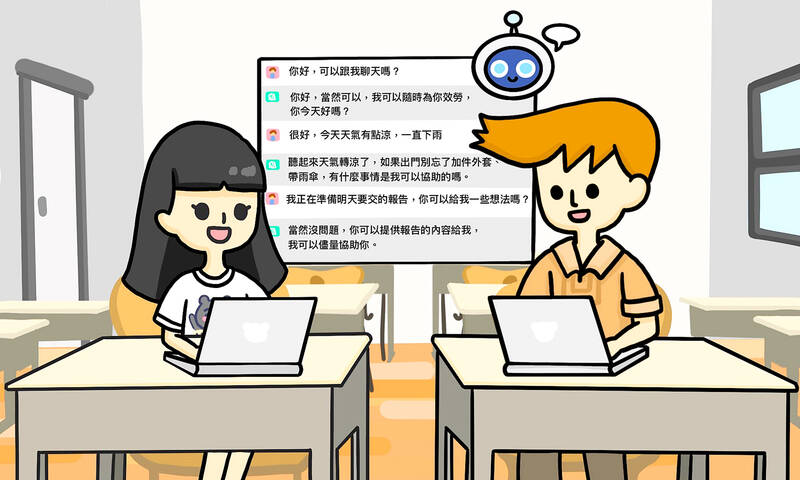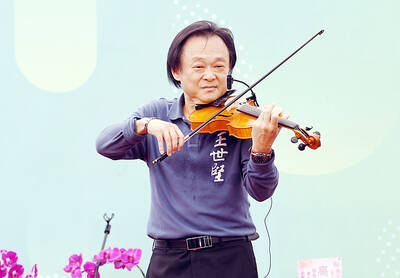對話 Dialogue
馬克:小實,最近很流行的聊天機器人,你用過了嗎?
Mǎkè: Xiǎoshí, zuìjìn hěn liúxíng de liáotiān jīqìrén, nǐ yòngguò le ma?

小實:我用過啊,現在的人工智慧真的很厲害!
Xiǎo shí: Wǒ yòngguò a, xiànzài de réngōng zhìhuì zhēn de hěn lìhài!
馬克:沒錯!只要輸入問題,它幾乎無所不知!
Mǎkè: Méicuò! Zhǐyào shūrù wèntí, tā jīhū wúsuǒbùzhī
小實:以前只能輸入文字,現在還有語音對答的功能。
Xiǎo shí: Yǐqián zhǐ néng shūrù wénzì, xiànzài hái yǒu yǔyīn duìdá de gōngnéng.
馬克:我知道,以後還會有辨識圖片的功能喔!
Mǎkè: Wǒ zhīdào, yǐhòu hái huì yǒu biànshì túpiàn de gōngnéng ō!
小實:這樣就更方便了,真像一個線上助理。
Xiǎo shí: Zhèyàng jiù gèng fāngbiàn le, zhēn xiàng yíge xiànshàng zhùlǐ.
馬克:但你知道嗎?聊天機器人也可能不小心提供錯誤訊息喔。
Mǎkè: Dàn nǐ zhīdào ma? Liáotiān jīqìrén yě kěnéng bù xiǎoxīn tígōng cuòwù xùnxí ō.
小實:我知道啊,所以自己還是要注意訊息的正確性。
Xiǎo shí: Wǒ zhīdào a, suǒyǐ zìjǐ háishì yào zhùyì xùnxí de zhèngquè xìng.
翻譯 Translation
Mark: Xiaoshi, have you tried the popular “chatbot” lately?
Xiaoshi: I have used it before. Artificial intelligence is really impressive nowadays!
Mark: That’s right! Just type in your question and it knows almost everything!
Xiaoshi: In the past, there was only text mode, but now there is a voice interaction function.
Mark: I know, there will be a function of identifying pictures in the future!
Xiaoshi: This makes it more convenient. It’s really like an online assistant.
Mark: But you know what? Chatbots may also accidentally provide incorrect messages.
Xiaoshi: I know, so you still have to pay attention to the accuracy of the information.
單字片語 Vocabulary
1. 人工 (réngōng) artificial
2. 智慧 (zhìhuì) wisdom
3. 厲害 (lìhài) impressive; awesome
4. 輸入 (shūrù) to enter
5. 無所不知 (wúsuǒbùzhī) omniscient
6. 文字 (wénzì text
7. 語音 (yǔyīn) voice
8. 功能 (gōngnéng) function
9. 辨識 (biànshì) to identify
教材音檔 Audio Files
教材影片 Video Files:
https://www.instagram.com/celc.nou_tw/guide/_/17999106352646292/
實踐大學華語中心提供
By Shih Chien University Chinese Language Center: https://chineseusc.com/

In English, “name idioms” are part of what makes English fascinating. Let’s put a few examples under the microscope. Doubting Thomas This expression stems from the Bible. Thomas, one of Jesus’s disciples, refused to believe Jesus had been resurrected from the dead. He declared he wouldn’t accept it until he could see the nail marks in Jesus’s hands and touch his wounds himself. Today, this idiom refers to someone who won’t believe something without concrete evidence. For instance, if your friend’s expertise is reliable, but you’re still suspicious, you might be a “doubting Thomas.” Smart Aleck The origin of this phrase likely comes from

A: Hey, the world’s major dictionaries just unveiled their words of the year for 2025. B: Yup, the Cambridge Dictionary chose the word “parasocial,” which refers to a connection that someone feels between themselves and a famous person they don’t really know. A: One-sided parasocial relationships with celebrities, influencers and even AI chatbots have clearly become more common. B: The Oxford Dictionary picked “rage bait” — online content designed to elicit anger by being frustrating, provocative or offensive in order to increase traffic to Web sites or social media accounts. A: The Collins Dictionary picked “vibe coding.” Let’s

A: Apart from the world’s major dictionaries, the online Dictionary.com actually picked “67” as its word of the year. B: What does “67” even mean? A: Even the dictionary wasn’t exactly sure about its meaning. The slang term’s origin might be traced to US rapper Skrilla’s song Doot Doot (67). Aren’t Taiwanese media outlets choosing the Mandarin word for 2025? B: Yeah and after hearing the song Good-for-Nothing, adapted from some catchphrases of Legislator Wang Shih-chien, I’m going to vote for the character “tsung” (hasty) from the lyrics. A: Hopefully, in the new year, we’ll be calm as the

Sea star wasting disease (SSWD) is a strange and serious illness affecting sea stars, or starfish. This disease causes sea stars to develop painful lesions, lose their arms, and eventually turn into a gooey, melted mess. Since it was first observed in 2013, millions of sea stars along the Pacific coast of North America have died from this __1__. Although viruses were once considered a possible cause, researchers now believe that environmental stressors and microorganisms are primarily __2__ for sea star wasting disease. One of the main environmental triggers appears to be warmer ocean water. When the water heats